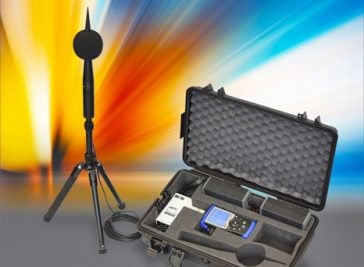
By Neil Nachbar
How loud is too loud when it comes to music being played at neighborhood bars?
To answer that question and settle a dispute between bar owners and residents of the town of East Greenwich, James Miller, professor of ocean engineering and acoustics expert at the University of Rhode Island, was hired by the town to conduct a sound study.
In June and July of 2019, Miller and URI graduate student Jesse Moore tested the noise levels near three establishments along East Greenwich’s waterfront: BLU on the Water, Nautika and Finn’s Harborside. Moore used a B&K 2250L sound level meter and an NTi noise monitoring system.
“This is a contentious issue in the town,” said Miller. “There was pressure to do a thorough and accurate study, with both sides anticipating the results.”
At a special town council meeting on Oct. 24, Miller shared his research results with a roomful of residents, restaurateurs, serving staff and musicians. In his detailed presentation, the professor put his research into context by scientifically describing a comfortable level of sound versus an uncomfortable level.
“I recommended limits of 60 decibels for high frequency sound and 65 decibels for low frequency sound,” said Miller. “Anything above these levels really impacts the residents nearby.”
The professor recommended that speakers be placed as low to the floor as possible and pointed away from residential areas and toward the water. He also suggested that sound-dampening walls or curtains and bales of hay or straw be installed to absorb the bass frequencies that cause the most disturbance.
Miller put the bar owners in touch with a soundproofing company based in Massachusetts who he worked with on another noise mitigation project.
An ordinance was proposed at the meeting that would require establishments during the summer to keep their high frequency sound between 55 and 60 decibels, depending on the time of day and the day of the week. For low frequency sound, 5 decibels above those levels would be allowed.
A decision on the sound ordinance was put off until the following hearing.
